AP English Literature and Composition
Put words under a magnifier.
Announcement- Holiday Assignments
1. Read three articles of literary criticism on Hamlet from the anthology I created for the class. Read one on Hamlet, one on Gertrude and one on Ophelia.
2. Watch youtube or PBS video clips on the following scenes-
- Ophelia and Hamlet ( Ophelia was sent to spy on Hamlet)
- Hamlet in Gertrude’s chamber
- Hamlet’s dueling with Laertes
- Be sure to observe the details in each scene.
3. Complete the AP Exam and turn it in the complete exam( including the three essays) on Jan. 6, 2014.
4. We’ll study Hamlet’s final two soliloquy on Thursday. Be prepared.
Hamlet E-Text
Hamlet Audio
Reading Quiz
Reading Quiz on Hamlet (Acts I & II)
| Ophelia | |||
| Gertrude | |||
| Rosencrantz | |||
| Guildenstern | |||
| Reynaldo | |||
| That Polonius has killed him by pouring poison in his ear. | |||
| That Hamlet should avenge his death by attacking Gertrude’s part in it. | |||
| That Claudius has killed him by pouring poison in his ear. | |||
| That Hamlet should not direct his revenge toward his mother but instead “leave her to heaven.” | |||
| That Horatio is Hamlet’s most trusted friend. | |||
| That Gertrude is jealous of her beauty and will try to have her removed from court. | |||
| That she should be careful to preserve her virtue in her dealings with Hamlet and should not believe all that he tells her. | |||
| That Claudius has had King Hamlet poisoned. | |||
| That she might see the Ghost if she walks upon the battlements at night. | |||
| That she is soon to be sent to Paris to marry Reynaldo. | |||
| To put forth false rumors about Laertes so that he (Reynaldo) can determine what Laertes is actually doing there. | |||
| To put forth false rumors so as to find the killer of King Hamlet. | |||
| To prepare for his marriage to Ophelia. | |||
| To find the cause of Hamlet’s sudden madness. | |||
| To bring Rosencrantz and Guildenstern back to Claudius’s court. | |||
| They have been summoned to court by Claudius and Gertrude so that they may spy on Hamlet and discover the cause of his madness. | |||
| Polonius has asked them to come to court so that they may protect Ophelia. | |||
| They bring the actors with them. | |||
| They try to lie to Hamlet about the purpose of their visit, insisting at first that they’ve simply come to see him. | |||
| Instructed by Polonius, they refuse to believe in Hamlet’s madness. | |||
| Claudius, speaking of his wish to kill Hamlet | |||
| Laertes, speaking of his desire to avenge his father’s death | |||
| Horatio, speaking of his failure to rescue Hamlet | |||
| Fortinbras, as reported by Valtemand | |||
| Hamlet, speaking of his failure to move against Claudius. | |||
| He enters her room as she is sewing; his clothes are dishevelled, and his look is piteous. | |||
| She knows that refusing to marry Hamlet will make him go insane. | |||
| Polonius reads a letter to Claudius and Gertrude, and Ophelia overhears it. | |||
| Horatio tells her. | |||
| Rosencrantz and Guildenstern tell her. | |||
| They put on a dumb show of pouring poison in the King’s ear. | |||
| They tell of Priam’s queen, who, when Priam is struck down by Pyrrhus, cries out in agony at her loss. | |||
| The Player Queen protests her love for the Player King. | |||
| The players discuss at length their willingness to do Hamlet’s bidding. | |||
| He wants to find out whether Claudius is keeping him away from Ophelia. | |||
| He want to find out whether Claudius killed King Hamlet. | |||
| He wants to know whether Claudius seduced Gertrude before King Hamlet’s death. | |||
| None of the above. | |||
| All of the above. | |||
| The play that Hamlet asks the players to perform. | |||
| The rule book that Hamlet cites to make the players be less wordy and false in their acting. | |||
| The secret words that Hamlet tells Ophelia so that she will know his madness is feigned and not real. | |||
| The book that Rosencrantz and Guildenstern bring to Denmark to cheer Hamlet up in his madness. | |||
Acts III, IV, and V
| To Rosencrantz and Guildenstern; he is chiding them for their false behavior. | |||
| To Laertes; he is asking Laertes to stand with him against Claudius. | |||
| To Horatio; he is about to ask Horatio to observe Claudius’s behavior. | |||
| To Claudius; he asks Claudius to recommend a servant. | |||
| To Polonius; he is echoing Polonius’s advice to Laertes. | |||
| Gertrude | |||
| Ophelia | |||
| Player Queen | |||
| Portia | |||
| Calpurnia | |||
| Rosencrantz and Guildenstern | |||
| Ophelia | |||
| Laertes | |||
| Fortinbras | |||
| Polonius | |||
| Gertrude | |||
| Ophelia | |||
| Horatio | |||
| Rosencrantz and Guildenstern | |||
| Polonius | |||
| The play-within-the-play for which Hamlet writes a few extra speeches | |||
| The book filled with “words” that Hamlet shows Polonius | |||
| The source for Hamlet | |||
| The First Player’s speech on the tale of Hecuba and Priam in Act II | |||
| He sees Ophelia and thus learns of her madness | |||
| He learns of his father’s death | |||
| He confronts Hamlet and fights with him. | |||
| He decides to descend to trickery and poison to kill Hamlet during the fight. | |||
| He watches Ophelia drown. | |||
| The father of Rosencrantz and Guildenstern | |||
| A sycophantic courtier with elaborate speech who carries the terms of the contest with swords to Hamlet | |||
| The Prince of Norway whose progress toward Denmark becomes ever closer as the play continues | |||
| The courtier killed in the last few minutes of the play. | |||
| The gravediggers (clowns) engage in a humorous discussion of the propriety of burying a suicide in consecrated ground | |||
| Hamlet picks up and contemplates the skull of Yorick, the king’s jester | |||
| Laertes and Hamlet struggle and fight in Ophelia’s grave. | |||
| Gertrude scatters flowers in Ophelia’s grave, saying “sweets to the sweet, farewell.” | |||
| She is killed by Claudius, who suspects her of aiding Hamlet in bringing about his downfall | |||
| She tries to stop the fight between Laertes and Hamlet, and she is killed with Hamlet’s sword | |||
| She kills herself after Hamlet’s death. | |||
| She drinks from the poisoned cup of wine meant for Hamlet | |||
| Horatio: “Good night, sweet prince, And flights of angels sing thee to thy rest” | |||
| The Ambassador: “Rosencrantz and Guildenstern are dead.” | |||
| Hamlet: “O I die Horatio” | |||
| Fortinbras: “Go bid the soldiers shoot.” | |||
Pre-Reading Lessons
Objectives: Students will answer the question: why do we still read Hamlet? How relevant is the character to our life?
Aim; Why is Hamlet still relevant?
Materials: the Video Clip from PBS Shakespeare uncovered
Assessment: Quick Write: How do we see ourselves in the character of Hamlet?
- Watch the video
- Students use their notes to share their perceptions on Hamlet
- Respond to the Quick Write
Learning Sequence
- Why Shakespeare’s Hamlet? Based on our reading about the play, why do you think are we still drawn to this tragedy? Do Think-Pair-Share activity.
- Watch the video clip and listen to David Tennant’s interviews and narration about why he is fascinated by the role. Take notes when necessary.
- Discuss our notes.
Quick Write: How do we see ourselves in the character of Hamlet?
Homework: Visit the site about Elizabethan England . Read about the Elizabethan time and have a true understanding of Shakespearean period’s audience. Be ready to share your notes in class for the next lesson.
Lesson 1-4 Based on Act I
Lesson 1 Act 1 Scene 1
Objectives:Students will identify the elements in the beginning scene of the play and discuss the effect of them.
Aim: What is the mood of the opening scene? What are the implications and complications set in motion by the ghost scene?
- Folger Edition Hamlet
- Hamlet with David Tennant
- Full Video of Hamlet by Shakespeare Royal Theater
- Death and Dying in Hamlet and Macbeth
- Timeline of Shakespeare’s Plays
Which Shakespeare character are you? Take a survey.
What are some of the effects of setting a play in motion by having a ghost appear? How would an audience be affected today? How might Elizabethan audiences have been stirred? Why?
Visit the site about Elizabethan England . Read about the Elizabethan time and have a true understanding of Shakespearean period’s audience.
Procedures:
- Listen to Act I, Scene 1. See Folgers’ text of Hamlet
- How does Shakespeare set a mood, explain to the reader what has gone before, build suspense, and also foreshadow things to come?
- As the play opens, what is Bernardo’s state of mind when he asks ,”Who is there?” What are we told immediately about the time, place, and atmosphere of scene 1?
- Who is Horatio? How does the encounter with the Ghost help to characterize Horatio?
- Describe the appearance, identity, and actions of the Ghost.
- What background information do we learn from Horatio?
- Upon the Ghost’s second appearance, what three possibilities does Horatio suggest for the appearance of spirits? Why does the Ghost disappear? What do we learn here about the superstitious beliefs of the times?
- What future events in the play are foreshadowed at the end of the scene?
Homework Assignment #1
1.Answer questions 4-8 in the lesson. Provide textual evidence for your responses.
2.In the 1 st scene of a play a playwright often tries to:
- Set the mood of the play
- Fill in the past for the reader or audience
- Introduce the main themes
- Create interest by building suspense.
- Introduce the main characters
- Foreshadow future events.
How well has Shakespeare fulfilled these tasks in the 1 st scene of Hamlet ? To what extent would you agree that the 1 st scene is the “embryo” of the play’s later development?
Lesson 2 Act I Scene 2 See Folgers’ text of Hamlet
Objectives: Students will identify Hamlet’s character based on the his attitude toward his mother, Gertrude’s remarriage.
Aim: How does the event of Gertrude’s remarriage shed light on the character of Hamlet?
Do Now: Journal #2
What reactions would the American people have had if Jacqueline Kennedy had remarried soon after the death of President Kennedy in 1963? What is considered ” a decent period of mourning” in your culture? And in America today?
I. Review: From the opening scene, what predictions can we make about the future events ?
II. Listen to Act 1 scene 2 . Did you come across any situation in scene1&2 that could cause problems for Prince Hamlet?
III. Discuss the following questions:
- How does Claudius’ initial speech reveal his character?
- use of royal “we”
- Antithesis-the balancing of two contrasting ideas, words, phrases, or sentences in parallel grammatical form, i.e.”with mirth in funeral and with dirge in marriage”. What feelings do these juxtapositions evoke?
- Choice of words : why does Claudius remember old Hamlet with “wisest sorrow” rather than “deep sorrow”?
- Order of ideas he presents: Although Hamlet’s mourning is of major concern to Claudius., why does he justify his marriage to Gertrude, deal with Norway’s impending invasion, and respond to Laertes’ petition before he address Hamlet?
2.. Addressing the court, Claudius uses the expression, “With mirth in funeral, and with dirge in marriage”, what does this line of contrasts mean beyond his own situation?
3. Why was Claudius not Hamlet made king after the death of Old King Hamlet? Where had Hamlet been at the time of his father’s death?
4. What is meant by the word incest ? How has the connotation of the word changed?
5. In his first formal address, how does Claudius justify his present situation? When he turns to affairs of state, how competent an executive does he prove himself to be?
6. Who is Laertes?
7. Explain the two puns made by Hamlet. What do they show about Hamlet’s state of mind.
- What is the double meaning in Hamlet’s response to his mother,”Ay, madam, it is common?” Why does Hamlet scornfully list all of the usual signs of mourning ? What comfort does Claudius offer Hamlet for the death of his father? Is it natural for men to be as objective as Claudius would have us act?
- What is Claudius’ answer to Hamlet’s request to return to Wittenburg? Why does Gertrude intercede? How is Hamlet’s rude reply accepted by Claudius? Why?
- When Hamlet is left alone after the departure of the rest of the court, how must he feel?
- Read Hamlet’s 1 st soliloquy. What action is Hamlet contemplating? Why? What does this show about his character? What holds him back from acting out his desire? How does Hamlet explain Gertrude’s great ” sin and crime”? What does he mean by “Frailty, thy name is women”? Why must he hold his tongue?
- Find lines in the soliloquy that show feelings of despair, grief, bitterness, anger, and resignation; or any word that gives clues to Hamlet’s innermost thoughts.
- Why does Hamlet insist on knowing the details of the Ghost’s appearance and actions?
- Where does Hamlet show determination?
- Characterize the young Hamlet. How has his mood changed throughout his part of the scene? Could such a prince make a successful sovereign? Explain.
IV. Visualize the soliloquy. Discuss “what is really bothering Hamlet?”
Homework Assignment #2
1. Analyze Claudius ‘ speech by considering the following-
2. Write a micro essay on Hamlet’s 1st soliloquy. How does Shakespeare use diction, figures of speech and tone to reveal Hamlet’s state of mind.
Lesson 3 Act I Scene 3 See Folgers’ text of Hamlet
Objectives: Students will examine the child-parent relationship describes in this scene within Polonius’s family based on the textual evidence.
Aim: What is the child-parent relationship describes in this scene within Polonius’s family?
Do now: Journal #3
The complaint is often voiced today that the younger generation is out of control and that is the parents who are to blame. How true is the statement? Should love or obedience to parents’ wishes prevail when a conflict between the two develops? Comment on it.
- At the end of Scene 2, what do you expect to happen next in the play? Why does Shakespeare shift the attention to the development of minor characters?
- What are the feelings that exist between Hamlet and Ophelia?
- What advice does the departing Laertes give to his sister about Hamlet? What does this advice reveal about Hamlet, and Laertes himself? Why does he not trust Hamlet?
- How does Ophelia receive her brother’s advice?
- In your opinion, how worthy of serious consideration are the words of Polonius to his son? How do you interpret the three lines beginning, “This above all…”? What ideas are especially meaningful for our time? Which precept has great values for adolescents? Why?
- How do you react to the suggestion that these lines “are not at all idealistic but merely practical considerations for worldly success”?
- How do you react to the suggestion that these line are “empty, pompous words delivered by a bumbling old man”?
- How appropriate is Polonius’s supervision of his children? How might the apparent absence of a mother for his children alter his role?
- Paraphrase the language of Polonius’ advice in colloquial English and make up a paralle situation in which the words make sense.
- What can we infer about Polonius from his choice of words? What do Polonius’ words reveal about his belief, philosophy, and values?
- How does the suspicious nature of Polonius show itself soon after Laertes leaves?
- By modern standards, how wise is Polonius in his advice to his daughter?
- When Ophelia says to her father: “I shall obey.” Should we expect her to keep her word? What is your understanding of a dutiful child of current time?
- Characterize Ophelia from what you have observed in this scene.
- What is the relationship like in Polonius’ family? What does each of the family members want?
Homework Assignment #3
Write a micro essay on how Shakespeare uses diction and structure to reveal Polonious character as a father.
Lesson 4 The Time is Out of Joint (Act I, scene 4 & scene 5 ) See Folgers’ text of Hamlet
Objectives: Students will analyze Hamlet’s character through his initial reaction to the ghost’s tale.
Aim: What decision should Hamlet make in facing such a revelation by the ghost? What’s more added to Hamlet’s problem?
Do now: Journal Writing:
Who is or might be a tragic hero in this play based on your knowledge of a tragic hero. Do inner or outer forces work to make the tragedy? Can an intellectual-like Hamlet- be a tragic hero?
- Read scene 4 & 5
- Before you come to any conclusions about Hamlet’s reactions to the Ghost, read this document of “Ghosts and Spirits”. It is an extract from Of Ghosts and Spirits Walking by Night , translated into English in 1572. Note, though, that it presents a Protestant view of the subject, while Hamlet’s Denmark is Catholic.
- Discuss the following questions after finishing reading the two scenes.
- How does Shakespeare repeat his device for surprising the audience at the entrance of the Ghost?
- Some critics have seen Hamlet’s speech about drinking as a restatement of Aristotle’s idea of the importance of the hamartia , or tragic flaw, in drama. In which lines does Hamlet express the Aristotelian concept of tragic flaw?
- How does Hamlet’s first speech to the Ghost show the doubts that exist in his mind about the nature of his apparition?
- How does Hamlet respond to the attempts of Horatio to stop him from following the Ghost? How do these actions deny the idea that Hamlet is little more than a dreamer?
- The Ghost is evidently in purgatory. What does this mean?
- What does Hamlet say “O my prophetic soul”?
- What further shocking disclosure does he Ghost make to Hamlet?
- Why does Shakespeare have the Ghost go into such detail about the murder itself?
- What demand does the Ghost make upon Hamlet about Claudius? About Gertrude? What effect does the Ghost’s revelation have on Hamlet?
- Why does not Hamlet immediately tell all to Horatio? How can you explain Hamlet’s odd, almost farcical, behavior towards the end of the scene?
- Examine Hamlet’s language after he sees the Ghost and during his conversation with Horatio and Marcellus. What assumptions can we make about Hamlet’s state of mind from the words he uses and the way he speaks to his companions at this point of the play? Speculate on why Hamlet decides to put on an “antic disposition”.
Quick Write: What’s your first impression of Hamlet’s character through his initial reaction to the ghost’s tale?
Homework Assignment #4:
Hamlet concludes the scene with the rhyme tag: The time is out of the joint. O cursed spite/ That ever I was born to see it right. What feelings are expressed in these lines? Why is the task before Hamlet not an easy one? How well is Hamlet suited by his temperament and character to fulfilling the Ghost’s wish? What do you expect him to do next? Do you think Hamlet will take revenge? Before you make any decision, read Francis Bacon’s short essay that provides a marvelous insight into the attitudes of intellectuals during Shakespeare’s time towards revenge. The essay is slightly cut here. What is particularly interesting is the attitude it takes towards natural feelings, which strongly contrast the ghost’s.
Lesson 5 “What A Rogue, Peasant Slave am I” Soliloquy Act 2 Scene 2
Objectives: Students will examine Hamlet’s self-perception by analyzing the diction, figures of speech and syntax of the soliloquy.
Aim: How does Hamlet perceive himself? How does Shakespeare use language to reveal it?
Materials: a hard copy of the soliloquy; online dictionary access; an Analysis Tool; audio recording of Hamlet Act 2 Scene 2 ( http://etc.usf.edu/lit2go/94/hamlet/1673/act-2-scene-2/ )
Assessment: Students will write a micro essay to analyze Hamlet’s self-perception through diction, imagery and syntax.
Do Now : Journal writing- From the first two acts we have read, what is your impression of Hamlet’s character? Write for about 4 minutes to describe Hamlet’s character.
Learning Sequence:
- We’ll use Think-Pair-Share activity to share our understanding of the speech- Read around in pairs line by line of the soliloquy. Read around by the period or exclamation marks, or question marks.
- Think to yourself after reading. Use the annotations you have made. What is Hamlet talking about? What words or phrase or lines stand out the most or show hamlet’s feelings or thoughts? Why? Write freely in your notebook your initial understanding of the speech.
- Share with a partner your writing. Talk to each other about the speech using ideas from your free writing. Jot down new ideas you have gained from the pair –share.
- We’ll unpack the meaning by discussing the following Text-Based Questions-
- What examples of diction paint a vivid picture of Hamlet?
- Who is Priam? Hecuba? What book is Aeneid? What’s it about?
- How does Hamlet comment on the player’s acting of the speech from Aeneid?
- How does the player express Hecuba’s feelings and reactions to her husband, Priam’s murder?
- How, according to Hamlet, will the player act like if the player knows Hamlet’s feelings towards his father’s murder?
- Make a list of names that he called himself in the soliloquy.
- Quick Write: How does Hamlet characterize himself at this point
- How accurate a description is it of his character (second section)? Find lines and phrases that explain why Hamlet thinks himself a coward. Do you think he is a coward, or is he acting by looking for external evidence to prove Claudius’ guilt?
- At what line does Hamlet’s self-castigation reach its peak?
- Why is “O vengeance!” a line by itself? How does this line deflate Hamlet’s pent-up emotions?
- What plan does Hamlet reveal to the audience at the end of this soliloquy.
Assessment: write a micro essay to analyze Hamlet’s self-perception through diction, imagery and syntax.
Homework Assignment: Finish the micro essay to analyze Hamlet’s self-perception through diction, imagery and syntax.
Analysis Tool
| /Diction, Syntax, Imagery or Figures of Speech | of the Example | How and what does the example say about Hamlet’s self-perception? |
Lesson 6 Hamlet and Ophelia Act III, scene 1
- To study and understand Hamlet’s desperate feelings as expressed in the “To be or not to be” soliloquy
- To experience the heartbreak of renunciation scene in terms of Hamlet’s and Ophelia’s expression of their feelings and attitudes
Aim: How does Shakespeare use language to show Hamlet’s question about his existence?
Materials: copies of Soliloquy, master reading of “To Be or Not To Be” ( http://etc.usf.edu/lit2go/94/hamlet/1674/act-3-scene-1/ ), analysis tool
- Listen to the recording ( http://etc.usf.edu/lit2go/94/hamlet/1674/act-3-scene-1/ ). Annotate while listening.
- Hamlet on Hamlet: Introspective Action(To be or not to be soliloquy) Convert the Soliloquy to an argument: Select two students with contrasting voices and ask them to read the selected “to be or not to be script”. HAMLET
Reader1: To be, or not to be: that is the question: Reader 2: Whether ’tis nobler in the mind to suffer The slings and arrows of outrageous fortune, Read 1: Or to take arms against a sea of troubles, And by opposing end them? Reader 2: To die: to sleep; No more; and by a sleep to say we end The heart-ache and the thousand natural shocks That flesh is heir to, Reader 1: ’tis a consummation Devoutly to be wish’d. Reader 2: To die, to sleep; To sleep: perchance to dream: ay, there’s the rub; For in that sleep of death what dreams may come When we have shuffled off this mortal coil, Must give us pause: Reader 1:there’s the respect That makes calamity of so long life; Reader 2: For who would bear the whips and scorns of time, Reader 1:The oppressor’s wrong, Reader2: the proud man’s contumely, Reader 1: The pangs of despised love, Reader 2: the law’s delay, Reader 1:The insolence of office Reader2: and the spurns That patient merit of the unworthy takes, When he himself might his quietus make With a bare bodkin? Reader 1: who would fardels bear, To grunt and sweat under a weary life, Reader 2: But that the dread of something after death, Reader 1: The undiscover’d country from whose bourn No traveller returns, Reader 2: puzzles the will And makes us rather bear those ills we have Reader 1: Than fly to others that we know not of? Reader 1 and 2 : Thus conscience does make cowards of us all; And thus the native hue of resolution Is sicklied o’er with the pale cast of thought, And enterprises of great pith and moment With this regard their currents turn awry, And lose the name of action.–Soft you now! The fair Ophelia! Nymph, in thy orisons Be all my sins remember’d.
- Had Hamlet revealed such desperate feelings that he thought of suicide? When? (refer to the1st soliloquy)
- How has Hamlet reason to be more despondent than he was earlier?
- Some critics view this speech as a general philosophical discussion. Can you justify this point of view?
- What view of death does Hamlet have in this speech? How does it compare with his view of life in the same speech?
- What are some of the things that he says make a long life calamity?
- How personal does he intend these slings and arrows to be? What would a modern life’s ills include?
- Why does Hamlet reject the idea of suicide at last?
- How reasonable is his implication that to live is cowardly, to die courageous? What unfinished business may play a part in Hamlet’s decision to live?
- When Ophelia appears, why does Hamlet say,” Nymph, in thy orisons be all my sins remembered’?
Part B: Hamlet and Ophelia
- How much Ophelia feel, knowing that she is performing for an audience and the King? How genuine are the emotions she expresses?
- What beautiful poetic lines can you find in Ophelia’s utterances?
- What’s the double meaning of Hamlet’s word honest ? In what respects has Ophelia been honest with him?
- Why does Hamlet tell her to enter a nunnery? Is his self characterization in this speech a valid one? Discuss.
- Argue: Hamlet knows from the very beginning of the scene that Polonius and Claudius are watching him ; Hamlet does not know until later in the scene that he is being watched; Hamlet is unaware that he is being watched throughout the nunnery scene.
- For each interpretation, what is Hamlet’s objective? What specific gestures, inflections, movements, or pause could an actor use to show this objective? How does the objective affect the subtext?
- What is the “calumny” to which Hamlet refers? Explain Hamlet’s strange use of the word monstrous .
- When Hamlet castigates Ophelia for the falseness and deceitfulness of women, is he thinking of her, of his mother, or of women in general?
- In her final speech, what picture does Ophelia paint of the Hamlet that once was? How deep was her love for him? How much love still remains?
10. Assessment: Quick Write – In this scene, Hamlet’s actions are viewed from several angles. Is he acting from a grand plan? Yes? No? Why? What reasons must Hamlet have had in his renunciation of Ophelia ? How might he have been trying to protect her?
11. What are the full implications in Claudius’ closing line: “Madness in great ones must not unwatched go”? Does Claudius actually believe that Hamlet is mad?
Homework Assignment: Use the Analysis Tool to help you read closely of “To Be or Not To Be” Soliloquy. Write a micro essay to discuss Hamlet’s state of mind through diction, figures of speech and syntax.
The Queen’s Closet Act III Scene 4
Objectives 1. Students will analyze how Shakespeare uses diction, tone and extended metaphor to reveal Hamlet’s relationship to his mother. 2. To explore a possible basis for understanding Hamlet’s action in this scene
Aim: How does Shakespeare uses diction, tone and extended metaphor to reveal Hamlet’s relationship to his mother? What’s the possible basis for Hamlet’s action?
- “ Introductory Lecture on Shakespeare’s Hamlet “
- Ernest Jones’s Hamlet and Oedipus ( http://www.shakespeare-navigators.com/jones/ )
- Text ( The Queen’s Closet Act III Scene 4 )
- Norman Holland and Psychoanalysis
Do Now : Journal Writing Some critics interpret use the “Oedipus complex” theory to interpret Hamlet’s actions throughout the play. “Oedipus complex” is a subconscious sexual attachment to his mother, remaining from his earlier childhood. Critics usually cite the words of Act III, scene 4 as evidence for this interpretation. What is your reaction to a psychoanalytical interpretation of a work of literature that was written hundreds of years before Freud outlined his theories of human behavior?
Activities Part 1 Before the Killing of Polonius 1. Polonius has decided once more to resort to spying as a method of gaining information. When has he done so before? 2. How does Gertrude interpret Hamlet’s state of extreme agitation? 3. How important is Hamlet’s behavior toward his mother in the beginning of this scene? 4. When Hamlet hears Polonius call out from behind the arras, he immediately stabs through the arras and kills him. Why was this act so uncharacteristic of Hamlet? How do you explain his sudden rashness of spirit? 5. What lines show us that Hamlet thought that he was stabbing the king? 6. How do you explain Hamlet’s lack of remorse over the death of Polonius?
Part II After the Killing of Polonius 1. What accusations does Hamlet make against his mother? How does she react at first? 2. What evidence is there that Gertrude had no knowledge of the murder of King Hamlet? 3. How does Hamlet compare his father and his uncle? 4. How does he explain his mother’s actions in marrying Claudius? 5. What finally touches the conscience of the Queen? What word “enter like daggers” into her ears? 6. Where does Hamlet once again show that he considers Claudius a usurper? 7. Why does the Ghost appear at this point?How is his appearance different from his earlier appearance? 8. How do you explain that this time only Hamlet sees the Ghost when all who were present saw him on his other appearances? 9. How does Gertrude explain Hamlet’s conversation with the Ghost? To what extent does she seem to accept Hamlet’s denial of madness? 10. How do you explain Hamlet’s insistence that Gertrude “go not to my uncle’s bed”? 11. Hamlet says “Good night” to his mother four times before he finally leaves. Why does he linger each time? 12.What danger does Hamlet anticipate in England? What foreshadowing of his own plans does he provide us with? 13. The scene ends with a serious of puns after a coarse remark about “lugging the guts” out of the room. How can you explain this mixture of humor with the horror of the scene? 14. Both mother and son have ambivalent feelings about each other. Show how this is true for each. Hamlet said he is being cruel only to be kind. How much kindness is there in his treatment of his mother?
Homework Assignment: 1. Write a micro essay on how Shakespeare uses diction, tone and extended metaphor to reveal Hamlet’s relationship to his mother.
2. Read “ Introductory Lecture on Shakespeare’s Hamlet ” and find different interpretations of Hamlet’s problems. Keep a “Doubting and Believing ” journal to criticize the lecture.
3.Read excerpts from Ernest Jones’s Hamlet and Oedipus ( http://www.shakespeare-navigators.com/jones/ )
4. Read Norman Holland’s Shakespeare and Psychoanalysis ( page 59) http://ufdc.ufl.edu/UF00002277/00001/67j
- To become aware of a changed Hamlet in decline, being acted upon rather than acting
- To analyze Hamlet as a personality in contrast to Fortinbras
Do now: Journal Writing-Sometimes we see a color more clearly when it is contrasted with another color. Why can we often see our own situation more clearly when we compare it with some other person’s? Can you illustrate this from you own experience?
New Concept-Fortinbras may be seen as a contrast to Hamlet. In drama we often call such a person a “foil “(read about the origin of foil ). Although his problems are some what similar, his manner of dealing with them is much different. Notice how Hamlet himself sees the parallel between himself and Fortinbras
HAMLET VIS-A-VIS FORTINBRAS
- Fortinbras, until this point only talked about, finally appears on the scene in this act. What kind of man is he? What is the meaning of his name?
- How does Fortinbras happen to be traveling through Denmark at this time? (Check out the map of Denmark )(Also check out the map of Norway ).
- What is the Captain’s attitude towards the battle he is about to engage in? Does Shakespeare expect us to look upon the expedition of Fortinbras with admiration or with irony? How might he have looked upon it had this incident occured early in Act I?
- Before the reading of the soliloquy, ask: What part of this speech presents the theme or underlying idea? Which part points up the startling contrast between Hamlet and Fortinbras?
- How is Hamlet’s soliloquy’s, beginning on line 34, similar to the soliloquy delivered after he heard the First Player recite the lines about Hecuba? What triggered each train of thought? How does Hamlet compare himself with another in each of these speeches? How does each conclude?
- Where does Hamlet once again hint that he is coward? What is Hamlet’s attitude towards Fortinbras’s expedition? What would a modern opinion be of such a war? Under what conditions is “honor” worth the loss of life?
HW. Analyze Hamlet’s soliloquy in Act IV Scene 4( the turning point of Hamlet’s character”). How does Shakespeare use imagery, tone and diction to reveal the dramatic changes in Hamlet.
Lesson 9 Ophelia’s Madness Act IV, scenes 5 . 6 . 7 .
- To understand possible reasons for Ophelia’s madness and death
- To compare the character of Laertes with that of Hamlet
Journal response- Formative Assessment
a. How would you define true madness? How does it differ from Hamlet’s feigned insanity? b. What severe strains has Ophelia been subjected to that might explain her loss of reality? What kind of person might she be originally? What evidence can we find from the play to show that she might very well be susceptible to a mental breakdown?
Learning Activities:
Ophelia’s Madness
1. How do the two verses sung by Ophelia at first give an explanation of her breakdown? How do you explain Ophelia’s singing of a song like “Tommorrow is St. Valentine’s Day”?
2. How appropriate is Laertes’s epithet “Rose of May” to Ophelia?
3. When Ophelia distributes flowers to the King, Queen, and Laertes, each flower is meant to have symbolic meaning. What does each flower represent, and who should be given each flower?
Suggested Answer:
B. Laertes, Mad or Revenge
1. According to the King’s speech (lines 75-98), what have the people been whispering about the death of Polonius? What does this show about the kind of reputation Claudius must have had in and around Elsinore?
2.What is Laertes’s reason for bursting in on the King at the head of a mob? How does the King act in this dangerous situation? How is the situation of Laertes now similar to that of Fortinbras and that of Hamlet? Which of the two does Laertes most resemble in his actions? How does the King manage to calm Laertes’s rage?
3.What does the King seem to have in mind when he says to Laertes, ” Where the offense is let the great axe fall”?
4.In scene 7, what two reasons does Claudius give to Laertes for his relatively gentle treatment of Hamlet? How, at this point, might Laertes expect to have his revenge?
5.How does Claudius use flattery in preparing Laertes for his scheme against Hamlet? When Laertes shows a willingness to “cut his throat in the church,” how are we reminded of an earlier scene in the play? How does Laertes compare to Hamlet in this respect?
6.What plot does Claudius propose to Laertes? How does Laertes add some refinements of his own?
Quick Write: Why do you think Claudius responds as he does to Laretes?
Homework Assignment:
Were you surprised by the turn of events in this act( Claudius turned the table from being passive to plotting to kill Hamlet; Hamlet’s interactions with other characters) ?Describe your reactions.
Hamlet’s Return
a. What is the dramatic necessity of having the action-packed events of scene 6 described in a letter from Hamlet? How might a movie version of the play give added life to this scene?
b. Point out examples of disrespect and of threat in Hamlet’s brief letter to Claudius (scene 7).
Lesson 10 : Ophelia’s Death
The Queen’s description of the death of Ophelia is almost lyric. What is the effect of such a description? As it is described here, was the death of Ophelia accidental or was it a suicide?
Objectives: Students will be able to analyze the impact of Ophelia’s death and how it helps advance the plot and further reveals Hamlet’s character.
Aim: How does Ophelia’s death help advance the plot and further reveals Hamlet’s character?
Reading quiz- At her death, how does Ophelia appear to the audience? Are there any strength to compensate for her apparent weakness?
Activities/Lesson Development-
- When Ophelia dies, how villainous does the character of Laertes appear to be? Why?
- At Ophelia’s death, and Hamlet’s return, what state of mind is Claudius in? Why?
- Discuss Claudius’s lines in term of the three sons in Hamlet (Hamlet, Laertes, Fortinbras):
…what would you undertake
To show yourself your father’s son in deed
More than a words? Homework: 1. In this act, both Fortibras and Laertes are foils to Hamlet. What important aspects of Hamlet’s character are revealed by means of the contract between Hamlet and these two foil characters? Enrichment 2. Read J. Paris’s “Three Sons in Hamlet” in The Atlantic , June 1959, to compare the ways the three sons reacted to the burdens placed upon them as a result of their father’s deaths. 3. Read Mack, Maynard. “The World of Hamlet.”
The Graveyard Scene Act V , scene 1
To enjoy and understand comic relief in Act V as a device to heighten drama
To contrast the grief of Hamlet with that of Laertes and that of the Queen
All of us have burst into “nervous” laughter in very tragic moments. (Discuss a situation or two from students’ own lives.) What purpose does such comic action serve? When has Shakespeare used it successfully in another tragedy? Learning Activities
- Read aloud of the entire scene .
- What questions are the gravediggers debating at the beginning of the scene? ( You should not be misled by the designation clown, which is merely a Shakespearean convention.) What sense of class-consciousness do the gravediggers reveal? (It should be noted that these clowns are Elizabethan, not Danish, types.)
- What kind of humor did Elizabethans engage in? (Quibbling, puns, and riddle-asking.) Find examples in this scene.
- What is Hamlet’s immediate reaction to the singing of the gravediggers when he comes on the scene? Journal Write an entry to interpret Hamlet’s proverb: ” The hand of little employment hath the daintier sense.” What examples of satirical criticism can you find in Hamlet’s remarks to the gravedigger?
- Show how the gravedigger outwits Hamlet in their bantering conversation. Journal How is the age of Hamlet fixed in this dialog? Must we believe that Hamlet is thirty years old (according to some critics) after reading this passage? Has Hamlet acted like a thirty-year-old man throughout the play? Why or why not? Discuss.
Medial Summary
What is the significance of Hamlet’s speech while he is holding the skull of Yorick? How have the Hamlet’s ideas about life and death changed? (Why not, at this point, have the class learn correctly the often misquoted line, “Alas, poor Yorick! I knew him, Horatio”?) Why does Shakespeare have the conversation take a serious, almost morbid, turn at this point?
Comic relief is to relieve audiences from the tragic tension. Do you agree? Explain.” What other examples in literature use such “comic relief”?(Read an example in Twelfth Night ) How does the Rainbow scene in Silas Marner or any other scene that heightens drama in a piece of literature? What does Shakespeare hope to accomplish by introducing two clown grave diggers in a graveyard? (To heighten the tragic grief of Hamlet, Laertes, and Gertrude.)
- Explain the debate between Laertes and the Priest. What emotional tone should Laertes exhibit? The Priest? Why/ At what point does Hamlet realize that the funeral is for Ophelia? How must he feel upon learning this? How sincerely had he loved the fair Ophelia?
- Is the wrestling match and ranting argument between Laertes and Hamlet in Ophelia’s grave too melodramatic, or can the audience accept it as realistic? Discuss. Why were such scenes included in Elizabethan plays? Which of the two really loves Ophelia more?
9.How does Gertrude feel about the death of Ophelia? Does Claudius show any grief at all?
1.Stage directors and film produces have had to face several major problems in presenting this scene. What are these problems? Hoe would you, as a director or producer, solve them?
2.How does this scene, so skillfully placed in the play at this point, help Claudius? Work against Hamlet? If you were a member of an Elizabethan audience, would you (or would you not) expect Hamlet to avenge his father’s death? Why? What most likely event would you expect to happen? Why?
What does Shakespeare hope to accomplish by introducing two clown grave diggers in a graveyard? (To heighten the tragic grief of Hamlet, Laertes, and Gertrude.)
Summative Assessment
Choose one of the questions below to write an analytically essay on Hamlet.
2008. In a literary work, a minor character, often known as a foil, possesses traits that emphasize, by contrast or comparison, the distinctive characteristics and qualities of the main character. For example, the ideas or behavior of a minor character might be used to highlight the weaknesses or strengths of the main character. Choose a novel or play in which a minor character serves as a foil for the main character. Then write an essay in which you analyze how the relation between the minor character and the major character illuminates the meaning of the work.
2002, Form B. Often in literature, a character’s success in achieving goals depends on keeping a secret and divulging it only at the right moment, if at all. Choose a novel or play of literary merit that requires a character to keep a secret. In a well-organized essay, briefly explain the necessity for secrecy and how the character’s choice to reveal or keep the secret affects the plot and contributes to the meaning of the work as a whole.
2001. One definition of madness is “mental delusion or the eccentric behavior arising from it.” But Emily Dickinson wrote
Much madness is divinest Sense- To a discerning Eye-
Novelists and playwrights have often seen madness with a “discerning Eye.” Select a novel or play in which a character’s apparent madness or irrational behavior plays an important role. Then write a well-organized essay in which you explain what this delusion or eccentric behavior consists of and how it might be judged reasonable. Explain the significance of the “madness” to the work as a whole. Do not merely summarize the plot.
1998. In his essay “Walking,” Henry David Thoreau offers the following assessment of literature:
In literature it is only the wild that attracts us. Dullness is but another name for tameness. It is the uncivilized free and wild thinking in Hamlet and The Iliad , in all scriptures and mythologies, not learned in schools, that delights us.
From the works that you have studied in school, choose a novel, play, or epic poem that you may initially have thought was conventional and tame but that you now value for its “uncivilized free and wild thinking.” Write an essay in which you explain what constitutes its “uncivilized free and wild thinking” and how that thinking is central to the value of the work as a whole. Support your ideas with specific references to the work you choose.

Leave a Reply Cancel reply
Your email address will not be published. Required fields are marked *
Save my name, email, and website in this browser for the next time I comment.
This site uses Akismet to reduce spam. Learn how your comment data is processed .

William Shakespeare
Ask litcharts ai: the answer to your questions.
| . Read our . |
Welcome to the LitCharts study guide on William Shakespeare's Hamlet . Created by the original team behind SparkNotes, LitCharts are the world's best literature guides.
Hamlet: Introduction
Hamlet: plot summary, hamlet: detailed summary & analysis, hamlet: themes, hamlet: quotes, hamlet: characters, hamlet: symbols, hamlet: literary devices, hamlet: quizzes, hamlet: theme wheel, brief biography of william shakespeare.
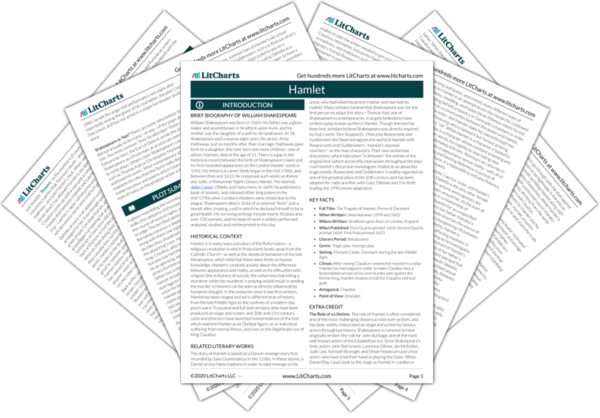
Historical Context of Hamlet
Other books related to hamlet.
- Full Title: The Tragedy of Hamlet, Prince of Denmark
- When Written: Likely between 1599 and 1602
- Where Written: Stratford-upon-Avon or London, England
- When Published: First Quarto printed 1603; Second Quarto printed 1604; First Folio printed 1623
- Literary Period: Renaissance
- Genre: Tragic play; revenge play
- Setting: Elsinore Castle, Denmark, during the late Middle Ages
- Climax: After seeing Claudius’s emotional reaction to a play Hamlet has had staged in order to make Claudius face a fictionalized version of his own murder plot against the former king, Hamlet resolves to kill the Claudius without guilt.
- Antagonist: Claudius
- Point of View: Dramatic
Extra Credit for Hamlet
The Role of a Lifetime. The role of Hamlet is often considered one of the most challenging theatrical roles ever written, and has been widely interpreted on stage and screen by famous actors throughout history. Shakespeare is rumored to have originally written the role for John Burbage, one of the most well-known actors of the Elizabethan era. Since Shakespeare’s time, actors John Barrymore, Laurence Olivier, Ian McKellen, Jude Law, Kenneth Branagh, and Ethan Hawke are just a few actors who have tried their hand at playing the Dane. When Daniel Day-Lewis took to the stage as Hamlet in London in 1989, he left the stage mid-performance one night after reportedly seeing the ghost of his real father, the poet Cecil Day-Lewis, and has not acted in a single live theater production since.
Shakespeare or Not? There are some who believe Shakespeare did not actually write many—or any—of the plays attributed to him. The most common “Anti-Stratfordian” theory is that Edward de Vere, the Earl of Oxford, wrote the plays and used Shakespeare as a front man, as aristocrats were not supposed to write plays. Others claim Shakespeare’s contemporaries such as Thomas Kyd or Christopher Marlowe may have authored his works. Most contemporary scholarship, however, supports the idea that the Bard really did compose the numerous plays and poems which have established him, in the eyes of many, as the greatest writer in history.

- Publish Your Course
- US EN US English
- Partnerships
- Link to Educator.com
- Study Guide
- Terms of Service
Home » English » AP English Literature & Composition » How to Use Hamlet For Everything

Rebekah Hendershot
How to Use Hamlet For Everything
Table of contents, ap english literature & composition how to use hamlet for everything.
Section 4: The Essays: Lecture 5 | 21:15 min
In this lesson, our instructor Rebekah Hendershot, teaches you How to Use Hamlet for (Almost) Everything. You’ll learn why Hamlet is a great text to use to just about any essay and where to find the questions use in this lesson. Rebekah uses Hamlet and The Search for Justice, Hamlet and the Illuminating Incident, Hamlet and the Symbol, and Hamlet and the Social Justice Issuse to teach different ways of tackling essay prompts. The lesson concludes with when you shouldn’t use Hamlet and then the Ultimate Essay Secret.
Share this knowledge with your friends!

Copy & Paste this embed code into your website’s HTML
- Show resize button - Allow users to view the embedded video in full-size.
Study Guides
Download lecture slides, related books & services.
| Our free lessons will get you started ( required). |
Lecture Slides are screen-captured images of important points in the lecture. Students can download and print out these lecture slide images to do practice problems as well as take notes while watching the lecture.
Download All Slides
- Lesson Overview 0:10
- Why Hamlet Works for Everything (Almost) 1:16
- Considered one of the greatest works of English literature
- It's long enough to be broken down
- Rich range of male and female characters
- Variety of interpretations
- Elements of many genres
- It's public domain
- Where to Find the Questions 3:18
- 2011: Hamlet and the Search for Justice 4:18
- “Life is a search for justice”
- What are you being asked to analyze?
- How to Answer 5:06
- How does Hamlet understand justice?
- Is his search for justice successful?
- 2011B: Hamlet and the Illuminating Incident 7:10
- A work of fiction uses the “illuminating incident“ as a ”magic casement”
- What are you being asked to explain?
- How to Answer 8:08
- The play Hamlet puts on before Claudius
- Literal summary and window into the soul
- Focus on Claudius's prayer
- 2009: Hamlet and the Symbol 9:40
- The definition of a symbol
- What are you being asked to focus on and analyze?
- How to Answer 10:24
- Yorick's skull
- How does it function in the work?
- What does it reveal about the characters or themes?
- 2009B: Hamlet and the Social Issue 12:14
- What are you being asked to do?
- How to Answer 12:52
- Uh-oh! Hamlet isn't very socially or politically conscious
- Class conflict in the play
- Gender in the play
- How to Answer, cont. 14:02
- What literary elements does Shakespeare use to explore this issue?
- How does this contribute to the meaning of the work as a whole?
- Don't Just Use Hamlet 16:37
- How about The Adventures of Huckleberry Finn and racism?
- Remember you are writing under a time limit
- Don't use Hamlet if you haven't read it
- The Ultimate Essay Secret 18:03
AP English Literature and Composition
Related Books
| Name | Description | Link |
|---|---|---|
| Grammarly is the world's leading software suite for perfecting written English. It checks for more than 250 types of spelling, grammar, and punctuation errors, enhances vocabulary usage, and suggests citations. |
Start Today!
- System Requirements
- Brand Logos
- © 2023 Educator, Inc. All Rights Reserved.
- Course Index

Please sign in to participate in this lecture discussion.
- Available 24/7. Unlimited Access to Our Entire Library.
Over 100+ comprehensive high school, college, and university courses taught by passionate educators.
Searchable Lessons
All lessons are segmented into easily searchable and digestible parts. This is to save you time.
Get Answers & Community Support
Ask lesson questions and our educators will answer it.
Downloadable Lecture Notes
Save time by downloading readily available lectures notes. Download, print, and study with them!
Study Guides, Worksheets and Extra Example Lessons
Practice makes perfect!
Start Learning Now
Our free lessons will get you started ( Adobe Flash ® required). Get immediate access to our entire library.
Membership Overview
- Search and jump to exactly what you want to learn.
- *Ask questions and get answers from the community and our teachers!
- Practice questions with step-by-step solutions.
- Download lecture slides for taking notes.
- Track your course viewing progress.
- Accessible anytime, anywhere with our Android and iOS apps.
College 101
- AP English Literature and Composition
AP English Literature and Composition Article Type: Connect
Ap® english literature and composition sample essays (the good, the bad, and the ugly).
The free response section of the beloved AP® Lit exam requires three written responses from students:
(1) A literary analysis of a given poem (2) A literary analysis of a given passage of prose fiction (this may include drama) (3) An analysis that examines a specific concept, issue, or element in a work of literary merit selected by the student
We're focusing on the third here, which scores students on a scale of 1-9 (and fingers crossed, not 0). The essays below represent the range of scores, and they're followed up with a score breakdown showing you what to do, and uh, what not to do.
Something else you should do? Prepare for your AP exams with Shmoop .
Scoring Guidelines
For all things AP Lit, including exam format, past exams, and scoring information, refer to the College Board's AP Central page .
According to the College Board : "The score should reflect the quality of the essay as a whole—its content, style, and mechanics. Reward the students for what they do well . The score for an exceptionally well-written essay may be raised by 1 point above the otherwise appropriate score. In no case may a poorly written essay be scored higher than a 3."
Many works of literature deal with family conflicts, or with individual characters whose relationships with family members change over time, or play a significant role in the character's understanding of him- or herself.
In a well-written essay, analyze how a character's relationship to a family member or members, or a character's understanding of family, functions in the work, and what it shows about the characters and themes of the work as a whole. Do not merely summarize the plot. You may select a novel or a play of literary merit.
Madness, a theme that runs throughout William Shakespeare's Hamlet , manifests itself as both an authentic illness as well as a shrewd manipulation. By play's end, there is even a gray area between the two that is difficult to discern. But whether the concern is Ophelia truly losing her mind following her father's murder, Hamlet's act of madness after meeting with his father's ghost, or the arguable proposition that Hamlet's "antic disposition" has devolved into the genuine article, one thing is for certain—Hamlet's relationships with Gertrude and Claudius have the greatest effect, directly or indirectly, on all of these instances.
Ophelia's madness is the only example that is assuredly real. Throughout much of the play, she is level-headed and quite competent. She's a bit sad, perhaps, at the vulgarity Hamlet displays toward her, especially prior to the play-within-a-play. It seems as if she truly loved Hamlet and was hopeful to marry him someday. Yet, she's able to carry out her father's wishes, returning the gifts Hamlet had given her in the past and informing him she does not love him.
When Ophelia appears before the king and queen following Polonius' death, though, she speaks nonsense and appears to have cracked. Her madness later takes the ultimate toll on her, as her drowning in the river is presumed a suicide.
This madness, and Ophelia's death, are certainly the result of Hamlet killing her father. But they can be traced back beyond her love for her father, all the way to Hamlet's relationship with his uncle/new stepfather. Hamlet's relationship with Claudius is already poor when the play begins because he's upset about Claudius taking his father's place so soon. It becomes immeasurably worse when King Hamlet's ghost arrives. The ghost informs Hamlet that Claudius murdered him so he could wear the crown of Denmark.
Once Hamlet learns of this duplicity, his whole relationship with Claudius is based on his desire for and inability to take revenge. Even though he takes an unreasonably long amount of time before finally gaining that revenge at the end of the play, everything he does from this point forward has something to do with it. It doesn't matter to Hamlet who is affected as he plots his revenge. It doesn't even matter to him that Ophelia, the woman he loved, is at first an innocent bystander, and then a pawn of her father and the king. Hamlet's act of madness centers on treating her in a borderline abusive manner.
Along with the way Hamlet treats her, the primary factor in Ophelia's suicide is Hamlet's murder of Polonius. Hamlet doesn't mean to kill Polonius, but it's a moment that most closely represents his act descending into real madness. When he is summoned to his mother's room following the play he stages, Hamlet's plan has just proven that the ghost told the truth, and Claudius really did murder his father. Hamlet's ire, and his desire to kill Claudius, are never higher than they are just then. This is also the moment when he hears a noise from behind the arras and, believing it's Claudius, Hamlet finally attempts to take his vengeance in a fit of rage. So, although he mistakenly kills the wrong man, Hamlet's utter disdain for Claudius ultimately leads to Ophelia's own madness and suicide.
Another moment where Hamlet might have truly lost it is when he stumbles upon Ophelia's funeral, which is how he learns of her suicide. After seeing Laertes' overblown show of grief, Hamlet makes a similar demonstration. He pronounces his love for Ophelia, jumps into the grave with Laertes, and they fight. He later claims he was just upset at Laertes' public display of affection, but it appears possible Hamlet is truly overcome at this point when realizing all that has happened. And again, since Ophelia's death can ultimately be traced back all the way to Hamlet's relationship with Claudius, it's fair to say this is another example of that relationship emphasizing the theme of madness in the play.
Despite Claudius being the center of his revenge plot, Hamlet is also greatly affected by his deteriorating relationship with Gertrude. Even before knowing the truth of his father's murder, Hamlet has lost his respect for his mother. He feels she's disrespected his father by remarrying so quickly after his father's death, and by marrying his father's brother. This is the main source of Hamlet's depression at the start of the play.
His relationship with his mother, then, makes his plan easier to carry out after meeting the ghost. Considering the change in his demeanor that everyone around the castle has noticed due to his depression, the "crazy" act he puts on seems like a logical progression. Had it been more out of character, more people might have caught on to his act.
The way things have changed with Gertrude also affects Hamlet because he doesn't have that source of comfort he should have from his mother. Considering she's part of the problem, he can't go to her for support, guidance, or comfort when trying to deal with Claudius and make good on his promise of revenge. Their relationship, then, isn't as directly responsible for the different acts of madness as is Hamlet's relationship with Claudius, but it holds some responsibility in terms of its omission from the help it should provide.
It's impossible to know whether Hamlet ever truly descends into madness, or if it never advances beyond his planned performance. Either possibility, though, is influenced most clearly by his relationships with Claudius and Gertrude. And the one definitive example of madness—Ophelia's cracking—is also a result of those relationships. Madness ultimately shapes this play more than any other theme, and the various types of madness on display all result from these two relationships of Hamlet.
Hoo boy, there's a lot of madness going on in Hamlet . This essay expertly argues that Hamlet's mommy and daddy problems are the cause of pretty much all of it. Doesn't matter much if it's real or fake, or even if he's the one gone mad.
This essay even makes a compelling case about how Ophelia's madness is only linked to her father's death superficially, and is really due to Hamlet's beef with Claudius.
Complete with textual evidence, attention to detail, and insightful analysis, this well-organized essay has a clear and convincing message. If there's a weakness, it's that this essay doesn't give equal time to Hamlet's relationship with Gertrude as it does to his relationship with Claudius. But the College Board understands that writing three essays in two hours is hard work, so those gracious folks aren't expecting absolute perfection. And because the prompt doesn't require more than one relationship discussion, anything mentioned about Gertrude is just gravy as far as we're concerned.
A central theme in Shakespeare's Hamlet is madness, which is demonstrated through Hamlet himself and through Ophelia. Hamlet's madness is seemingly all an act he perpetuates to help him gain vengeance for his father, while Ophelia's madness is a true tragedy. In both cases, the real and imagined cases of madness can be traced back to Hamlet's relationships with his mother and stepfather, Gertrude and Claudius.
Ophelia's madness is undeniably real. In her early scenes, she shows herself as a good daughter who is willing to carry out her father's plans, even though it pits her against Hamlet. Yet, following her father's death, she cracks. She sings and talks nonsense, and unlike Hamlet, there's no reason for her to put on an act. Following the unhinged manner in which she acts in front of the king and queen, it's not much of a surprise to discover that Ophelia has committed suicide.
Ophelia's madness and death are a direct result of Hamlet killing her father. But there's also a deeper reason for her madness. Her father's death isn't even supposed to happen. It's a mistake that stems from Hamlet's relationship with Claudius, and his desire for revenge.
Once Hamlet learns of Claudius' role in his father's death, everything becomes about taking revenge. All Hamlet's thoughts and actions are driven by what he's learned about Claudius. It doesn't matter to Hamlet who is affected as he plots his revenge. It doesn't matter to Hamlet that Ophelia is at first an innocent bystander, and then a pawn of her father and the king. He still purposely uses her, the woman he loves, as his primary way of putting on his act of madness. He treats her intentionally poorly as a means of showing everyone around him how crazy he's become, all in the name of fulfilling his plans for revenge.
The combination of Hamlet's horrendous treatment of her, topped with his murder of her father, is what drives Ophelia over the edge. When Hamlet kills Polonius, this is one moment where his act might possibly have given way to true madness. This happens directly after the play-within-a-play, which is when Hamlet discovers proof for himself that Claudius really killed his father. That revelation, and his belief that Claudius was the one spying on his mother and him, drives Hamlet to blindly drive his sword through the tapestry, which conceals Polonius. He does this in a fit of rage because of his hatred of Claudius. Polonius really ends up as collateral damage—as does Ophelia—but her madness, both their deaths, and Hamlet's possible true madness in that moment, are all the result of Hamlet's hatred of Claudius.
If Hamlet's feelings toward Claudius are to blame for all these events, then they are also naturally the reason Hamlet might have lost his mind a second time, this time at Ophelia's funeral. When he and Horatio come upon her funeral and he realizes she has killed herself, he understands the reasoning must be due to Polonius' death, possibly coupled with how he'd been treating her. And Hamlet knows better than anyone that, without his grudge against Claudius and need to put on his "antic disposition," none of this would have happened. This drives Hamlet to reveal himself to the gathering, jump down into the grave with Laertes, and begin a fight with him. It is possible this is simply a continuation of his act, but this could also be a moment of true emotion and hysteria overtaking him. He knows his actions drove Ophelia to her grave. He also knows Claudius is the reason behind all his actions.
Hamlet's poor relationship with his mother is also a cause of issues for him. He has already lost his respect for his mother because of her remarrying so quickly after his father's death, and because she married his father's brother. Even as the play begins, Hamlet is depressed, and it's primarily based on his mother's actions and what they've done to his relationship with her.
This relationship with his mother, then, helps him carry out his plan after meeting the ghost. Everyone has already seen a drastic change in his behavior and demeanor, so the "crazy" act he puts on seems like a logical progression. If it had come out of nowhere, it might have been harder for anyone to buy into.
Hamlet's madness, whether entirely an act or a combination of performance meeting reality, is a result of his relationships with Gertrude and Claudius. And though Ophelia would probably blame Hamlet for her condition, it's clear her madness also finds its roots in the toxic state of affairs between Hamlet and his parents. There's no escaping madness throughout the play, and all examples of it are rooted in that relationship.
Hamlet's relationship with Claudius is center stage again in this essay. Most of the persuasive analysis about the theme of madness comes from this area, with just a little bit of help provided by his disgust with Gertrude.
No doubt this essay is still plenty insightful when it discusses the reasons for Ophelia's transformation from dutiful daughter to raving crackpot. But there's a bit less evidence from the text and sophisticated language in this essay than in the nine-pointer.
A central theme in Hamlet is madness, which is demonstrated through both Hamlet and Ophelia. Hamlet's madness is primarily an act to help him gain vengeance for his father, although it's possible it becomes real at a few key moments. Meanwhile, Ophelia's madness is definitely real. In either case, this madness can be traced back to Hamlet's relationships with Gertrude and Claudius.
Ophelia's madness is undeniably real. Early in the play, she seems fine. She's a good daughter to Polonius and does what he says, even though it hurts her to make Hamlet upset. Following her father's death, though, she cracks. She's nothing like what she was earlier, singing and talking nonsense. Later, we find out she has committed suicide. This is a drastic change from what she's like in the beginning. And while this change is because of what Hamlet does, it goes deeper than that. Everything that causes her madness stems from Hamlet's relationship with Claudius, and his desire for revenge.
All Hamlet's thoughts and actions are driven by what he's learned about Claudius. It doesn't even matter to him that he hurts Ophelia in the process of his revenge. He purposely uses her, the woman he loves, as his primary way of putting on his act of madness. He treats her poorly to show everyone around him how crazy he's become, all to help him fulfill his plans for revenge.
Hamlet's abusive treatment of Ophelia, along with his murder of her father, drives her to madness. When Hamlet kills Polonius, this is one moment where his act might possibly have given way to true madness. He commits this murder in a fit of rage, but he believes it's Claudius he's killing, not Polonius. Polonius' interference puts him in the wrong place at the wrong time, right when Hamlet might be demonstrating genuine madness himself.
Hamlet might have also legitimately been mad with grief at Ophelia's funeral. When Hamlet discovers she has killed herself, he realizes his actions must have caused this. And he knows that, without his grudge against Claudius and need to act crazy, she would still be alive. This drives Hamlet to reveal himself to the gathering, jump down into the grave with Laertes, and begin a fight with him. It is possible this is simply a continuation of his act, or it might be something more.
Hamlet's relationship with Gertrude also plays a part in the theme of madness in the play. Even before knowing the truth of his father's murder, Hamlet has lost his respect for his mother because he feels she's disrespected his father by remarrying so quickly after his father's death, and by marrying his father's brother. This is why Hamlet is depressed at the start of the play.
His relationship with his mother, then, makes his plan easier to carry out after meeting the ghost. Considering how he has changed because of his depression, the "crazy" act he puts on seems like a logical progression.
All the madness displayed in this play has its roots in Hamlet's relationships with Claudius and Gertrude. The toxic nature of those relationships causes him to act crazy, possibly to really be crazy at a few points in time, and causes the actions that instigate Ophelia's madness.
This essay gives "reasonable analysis," as the College Board would put it, of Hamlet's scheme, how it causes Ophelia's mental breakdown, and how it all stems from the toxic fumes of his relationships with Claudius and Gertrude.
The analysis isn't as thorough or perceptive as the highest scored essays, though. For example, when Hamlet and Laertes duke it out in the graveyard like the Undertaker and Kane, there's only a passing mention of the fact that Hamlet might not be acting anymore.
Madness plays a crucial role in William Shakespeare's Hamlet . Hamlet himself has toxic relationships with his mother, Queen Gertrude, and his uncle, King Claudius. These relationships instigate a great deal of the madness in the play, from both Hamlet and Ophelia.
Ophelia is the character who demonstrates genuine madness. Late in the play, she seems to lose her mind. She speaks a lot of nonsense to the king and queen, and shortly later, we find out that she's dead of an apparent suicide. It seems as if her father's murder at Hamlet's hands is the cause of her madness. But, looking deeper, Hamlet only kills Polonius accidentally, when he thinks he's killing Claudius. So it's still Hamlet's terrible relationship with Claudius, and his desire for revenge, that really causes Ophelia's madness.
The reason Hamlet's relationship with Claudius is so toxic is two-fold. The main reason forms when the ghost of Hamlet's father shows up and tells him that Claudius actually killed him. This is what causes Hamlet to act crazy. He's beside himself with anger and grief, but he still feels he needs to determine if the ghost is telling the truth. He thinks that by acting as if he's lost his mind, he'll be able to investigate what the ghost has told him, and probably carry out vengeance against Claudius, as well.
Even before the ghost showed up, though, Hamlet's relationship with Claudius was also strained because of Hamlet's depression. Hamlet already hated that Gertrude remarried so quickly. And it's worse that she remarried Claudius, since he was the king's brother. Claudius doesn't like the way Hamlet was acting so down in the dumps, or the way he continually makes nasty remarks toward Gertrude. But once Hamlet really starts acting crazy and putting on this show to investigate, Claudius actually tries to have him killed. He seems to see through the act more than everyone else, who all think Hamlet is only acting this way because Ophelia rejected him.
Hamlet's relationships with Gertrude and Claudius are the determining factor in all the madness in the play. These relationships had already been affected because of Hamlet's grief for his dead father and his perceived lack of respect from his mother. Learning of Claudius' betrayal is too much for him to bear, causing his act of madness, and also indirectly being responsible for Ophelia's madness, as well.
The fall from a 7 score to a 6 score is more apparent than the fall from a 9 to an 8, and maybe even from an 8 to a 7. In this essay, the link between Hamlet's steaming pile of a relationship with Claudius and Gertrude and the play's madness is still explained, but the insight is getting weaker and less thorough. The discussion's beginning to get a little artificial for everyone's liking here.
The student's analysis, or lack thereof, of Ophelia's madness, and the need to look beyond her father's death to understand the real cause, is noticeably short and underdeveloped when compared to the higher scored essays. This essay also fails to examine whether Hamlet might've actually gone a little crazy himself in a couple of instances. It's just presumed that everything he does is an act, which could be true...if we had more discussion to back it up. (But really, that's probably giving him too much credit.)
In Hamlet , by William Shakespeare, the character Hamlet's poor relationships with his mother, Queen Gertrude, and his uncle, King Claudius, show a great deal about his madness, and madness is a major theme in the play.
It's shown early on that Hamlet is unhappy with the fact that his mother remarried so soon after her husband's (Hamlet's father's) death. The fact that she marries Hamlet's uncle just makes it worse. Hamlet consistently acts childish and makes snide remarks, like when he refers to Claudius as his "uncle-father" and Gertrude as his "aunt-mother." He has great disdain for her actions and considers them incestuous. Even though he goes on to put on a show of madness, it's possible that he actually does go a little mad, and there's no question that Gertrude's actions are a part of that.
Hamlet's relationship with Claudius contributes to his madness even more. He's already upset about this new marriage, which has caused him to lose his respect for his mother. Now, when the ghost of his father shows up and tells him that Claudius actually killed him, this makes things even worse. This is what actually causes Hamlet to act crazy. He thinks that by acting as if he's lost his mind, it will be easier for him to investigate what the ghost has told him, and probably to carry out vengeance against Claudius, as well.
Even before the ghost showed up, though, Hamlet's relationship with Claudius was also strained because of Hamlet's depression. Claudius doesn't like the way Hamlet was acting so down in the dumps, or the way he continually makes nasty remarks toward Gertrude. Once Hamlet really starts acting crazy, Claudius goes so far as to try to have him killed. He seems to see through the act more than everyone else, who all think Hamlet is only acting this way because Ophelia rejected him.
Hamlet's relationships with Gertrude and Claudius have a huge impact on the theme of madness. The changes that occur when you take a young man already grieving over his dead father and his perceived lack of respect from his mother, and combine them with the news of betrayal from another member of his own family, is enough to cause Hamlet to choose to act mad, and maybe even to actually go a little mad.
The difference between a 6 and a 5 is that a 5 is lacking even more in organization, is more simplistic and general in its analysis, and the biggie: it leans on plot summary more than it should.
This essay provides an accurate, but relatively one-dimensional, discussion of Hamlet's relationships with Gertrude and Claudius, and how they affect his show of madness. But the discussion doesn't go deeper than some nicely summarized plot points and it never digs into Ophelia's madness, which is a major part of the theme throughout the play.
There is no doubt that a character's relationship with one or more family members or friends in a book or play can have a drastic impact on the story as a whole. In the play Hamlet , the relationships that Hamlet, the main character, has with Gertrude, Claudius, and Ophelia, are these types of relationships. These relationships affect the theme of madness in the play.
Hamlet's relationship with his mother has taken a significant turn for the worse since his father died and she quickly remarried his uncle, the dead king's brother. Hamlet sees this as a betrayal of his father, as if his death didn't even affect Gertrude at all. He feels it's totally unreasonable for her to have moved on and remarried so quickly. Hamlet's relationship with her, then, becomes testy, as he treats her quite badly for what he thinks are her sins. If Hamlet really goes mad, Gertrude's actions are definitely a part of that.
Claudius has an even more direct effect on Hamlet's madness. Hamlet is disgusted enough with him already because he views this new marriage as incestuous. But when the ghost of King Hamlet appears and tells Hamlet that Claudius actually murdered him for the crown, this is what really puts Hamlet on the road toward madness. It's his desire to avenge his father that causes him to put on a display of madness.
Lastly, and maybe most importantly, is Hamlet's relationship with Ophelia. It appears that Hamlet and Ophelia had been in love with one another at some point in time. It's never entirely clear how Hamlet really feels about her as the play progresses. His treatment of her is a major part of his plan, since she's the one who relays information about his behavior back to Polonius and Claudius. So, their relationship is part of Hamlet's fake madness. But after Hamlet kills Polonius, it manifests real madness. Ophelia truly loses her mind and winds up killing herself. And Hamlet, upon discovering this at her funeral, jumps out of hiding and into her grave, seeming to have gone mad himself, at least momentarily.
In conclusion, madness is a major theme throughout the play. Hamlet's relationships with Gertrude and Claudius both cause him to put his plan of demonstrating madness into effect. And his relationship with Ophelia is not only a major part of that plan, but it also might cause him some real, temporary madness, as well as Ophelia's legitimate fatal madness.
This essay is about as deep as an above ground swimming pool.
It's fairly well-written, but Hamlet's relationships with Gertrude and Claudius are only given a paragraph each, so there's not much going on beyond, "Hamlet's uncle killed his father, so now Hamlet will act crazy." We'd call that an unsupported, oversimplified, plot-based explanation.
Plus, instead of discussing Ophelia's madness as a consequence of Hamlet's relationship with Claudius, this student discusses Hamlet's direct relationship with Ophelia. The problem is, Ophelia's not a family member, so not only does this discussion not fit the question, but there are a lot of complexities left unexplained here.
In Hamlet , Hamlet's understanding of family, and his relationship with some of his family members, affects the themes of the whole play. His relationships with his mother, Gertrude, and uncle/stepfather, Claudius, in particular, have the most drastic effects on the themes.
Hamlet's relationship with his mother isn't good anymore. When the play begins, his father, the king, is already dead, and his mother has already remarried Hamlet's uncle. Hamlet doesn't like the fact that she remarried right away. He thinks this happened way too quickly. Hamlet also thinks that the fact that she married her dead husband's brother is disgusting and wrong.
Hamlet's relationship with his uncle, the new king and his new stepfather, also isn't good anymore. Hamlet doesn't get along with him for all the same reasons he doesn't get along with his mother anymore. But Claudius also became the king, which is supposed to be Hamlet's job in the future. So, Hamlet has even more reason to hate Claudius now.
The changes in Hamlet's relationships with his mother and stepfather affect the play's themes pretty drastically. They show that family is important, but if what the ghost told Hamlet is true, then it's really not everything. Clearly, Gertrude and Claudius valued power more than family when they plotted against the old king. And Hamlet's sanity is also directly impacted by these two relationships. These changes are what cause him to put on an act of madness. But it's possible that he actually goes a little mad. Some readers read the play that way, and if Hamlet really does go crazy a little bit, it's because of the crimes Gertrude and Claudius committed, and how they affected Hamlet.
Hamlet's relationships with Gertrude and Claudius have a huge effect on the whole play. Their evil actions change who Hamlet is as a person and a character. The changes in these relationships have major repercussions on the themes of family and madness.
Yikes. This essay is way oversimplified. It's a 3 and not a 4 because it's oversimplified to the point of it being a "misreading and/or inept writing," as the College Board would call it. Sure, it hits on the changes in Hamlet's relationships with Gertrude and Claudius, but by barely scraping the surface, it's little more than a summary.
This essay attempts to touch on the ghost, but misses the mark in discussing this figure's critical role in informing Hamlet of the truth and driving the wedge between him and his "parents." The essay also fails to go beyond identifying family and madness as two themes in the play, so there's no real insight presented on these talking points.
In Hamlet , Hamlet had a lot of problems. Hamlet's problems include problems with his family, including his mother Gertrude, his new father Claudius and his sister Ophelia. Hamlet's problems are that he thinks his mother married his new father too fast after his original father died and also that he's in love with his sister. Because Hamlet hates his mother and new father, it causes him to have a lot of angst. He thinks a lot about killing himself. And when he finds out Opheila doesn't love him the way he loves her it makes him even more upset; this is why he jumped into Ophelia's grave at her funeral after he escaped from the pirates who took over his ship and killed Rosencrantz and Guildenstern. Hamlet's also upset that his friends Rosencrantz and Guildenstern don't like him anymore and are trying to trap him because the king asked them to.
If his mom didn't remarry only two days after his dad died then Hamlet wouldn't be so upset. He's not a fan of his uncle so he doesn't want him to be king. And also, Hamlet wants to be king someday. He feels like he's being replaced and like he'll never get to be king now. He thinks the king is after him so he never has a challenger to the throne, but Hamlet still doesn't want to kill the king. He thinks it's wrong and that it will automatically send him to hell, so he refuses to do it for the ghost.
Because of the death of Hamlet's father, his mother remarrying his uncle after just two days, and his sister not loving him romantically like he loved her (and then she killed herself, too, which upset Hamlet even more), Hamlet is upset, angry, and suicidal. His relationships with all his family members really changed a lot because all these things happened to him, and because his friends turned their back on him.
We've moved on to the College Board's class of poorly-written essays here. This writer clearly misread certain parts of the play, and the essay, aside from being poorly-written and weighed down with poor grammar and structure, is filled with inaccuracies.
For starters, Ophelia isn't Hamlet's sister, so (1) the essay is mainly a summary, (2) it's poor summary at that, and (3) it's completely haphazard. It jumps around from Ophelia's death to Rosencrantz and Guildenstern to Claudius not wanting Hamlet to challenge him for the throne. All without rhyme or reason. This incoherent essay also fails to answer the question, because it never mentions the themes of the play and how they're influenced by Hamlet's relationships with his family.
Hamlet used to, like, love his mom. But then she helped kill his dad. And then she married his uncle. So now he hates her.
Hamlet doesn't really know how family works. Now he's got a messed up situation with his mom and his uncle. His uncle is the new king and his dad is dead. His dad was the king. His dad's ghost is hanging around trying to get Hamlet to kill the new king.
Hamlet doesn't have a relationship with his uncle. I mean, how do you have a relationship with the guy who killed your dad and married your mom? He wants to kill his uncle for most of the book but he always chickens out or can't do it at the right time.
This is a bad and weird situation for Hamlet. He doesn't get along with anybody in his family. He's always moping around and acting all emo. And then he kills a bunch of people and gets killed. His family situation doesn't really work good.
There's no real introduction or conclusion to this essay, and there's only the vaguest attempt to answer the question. At one point, the essay—er, this informal piece of writing unrecognizable as an essay—even addresses the reader. It's a 1 because it gets a few facts right, but aside from those, this writing is way too short to carry any substance.
"This is a bad and weird situation" hardly passes for insight. 'Nuff said.
A score of 0 is either blank or very ugly. Avert your eyes.
AP is a registered trademark of the College Board, which was not involved in the production of, and does not endorse, this product.
Tired of ads?
Logging out…, logging out....
You've been inactive for a while, logging you out in a few seconds...
W hy's T his F unny?
Scores for 2024 AP Exams are available now. Sign in and get your reports .
AP English Literature and Composition Exam Questions
Free-response questions and scoring information.
Download free-response questions from this year's exam and past exams along with scoring guidelines, sample responses from exam takers, and scoring distributions.
If you are using assistive technology and need help accessing these PDFs in another format, contact Services for Students with Disabilities at 212-713-8333 or by email at [email protected] .
2024: Free-Response Questions
| Questions | Scoring | Samples and Commentaries |
|---|---|---|
|
--> |
--> |
2023: Free-Response Questions
| Questions | Scoring | Samples and Commentaries |
|---|---|---|
|
|
|
2022: Free-Response Questions
| Questions | Scoring | Samples and Commentaries |
|---|---|---|
|
|
|
|
2021 Free-Response Questions
| Questions | Scoring | Samples and Commentaries |
|---|---|---|
|
|
|
|
2020 Free-Response Questions
Note: The table below features a selection of free-response questions and related scoring information from the 2020 exam. You can find all of the 2020 FRQs and corresponding scoring information in AP Classroom question bank .
| Prompts and Student Samples | Scoring Commentaries | Scoring Information |
|---|---|---|
| |
|
|
| |
|
|
| |
|
|
|
| ||
2019 Free-Response Questions
| Questions | Scoring | Samples and Commentary |
|---|---|---|
|
|
|
|
2018 Free-Response Questions
| Questions | Scoring | Samples and Commentary |
|---|---|---|
|
|
|
|
2017 Free-Response Questions
| Questions | Scoring | Samples and Commentary |
|---|---|---|
|
|
|
|
2016 Free-Response Questions
| Questions | Scoring | Samples and Commentary |
|---|---|---|
|
|
|
|
2015 Free-Response Questions
| Questions | Scoring | Samples and Commentary |
|---|---|---|
|
|
|
|
2014 Free-Response Questions
| Questions | Scoring | Samples and Commentary |
|---|---|---|
|
|
|
|
2013 Free-Response Questions
| Questions | Scoring | Samples and Commentary |
|---|---|---|
|
|
|
|
2012 Free-Response Questions
| Questions | Scoring | Samples and Commentary |
|---|---|---|
|
|
|
|
2011 Free-Response Questions
| Questions | Scoring | Samples and Commentary |
|---|---|---|
|
|
|
|
2011 Form B
| Questions | Scoring | Samples and Commentary |
|---|---|---|
|
|
|
|
2010: Free-Response Questions
| Questions | Scoring | Samples and Commentary |
|---|---|---|
|
|
|
|
2010: Form B
| Questions | Scoring | Samples and Commentary |
|---|---|---|
|
|
|
|
2009: Free-Response Questions
| Questions | Scoring | Samples and Commentary |
|---|---|---|
|
|
|
|
2009: Form B
| Questions | Scoring | Samples and Commentary |
|---|---|---|
|
|
|
|
2008 Free-Response Questions
| Questions | Scoring | Samples and Commentary |
|---|---|---|
|
|
|
|
2008: Form B
| Questions | Scoring | Samples and Commentary |
|---|---|---|
|
|
|
|
2007: Free-Response Questions
| Questions | Scoring | Samples and Commentary |
|---|---|---|
|
|
|
|
2007: Form B
| Questions | Scoring | Samples and Commentary |
|---|---|---|
|
|
|
|
2006: Free-Response Questions
| Questions | Scoring | Samples and Commentary |
|---|---|---|
|
|
|
|

2006: Form B
| Questions | Scoring | Samples and Commentary |
|---|---|---|
|
|
|
|
2005: Free-Response Questions
| Questions | Scoring | Samples |
|---|---|---|
|
|
|
|
2005: Form B
| Questions | Scoring | Samples |
|---|---|---|
|
|
|
|
2004: Free-Response Questions
| Questions | Scoring | Samples |
|---|---|---|
|
|
|
|
2004: Form B
| Questions | Scoring | Samples |
|---|---|---|
|
|
|
|
2003: Free-Response Questions
| Questions | Scoring | Samples |
|---|---|---|
|
|
|
|
2003: Form B
| Questions | Scoring | Samples |
|---|---|---|
|
|
|
|
2002: Free-Response Questions
| Questions | Scoring | Samples |
|---|---|---|
|
|
|
|
2002: Form B
| Questions | Scoring | Samples |
|---|---|---|
|
|
|
|
2001: Free-Response Questions
| Questions | Scoring | Samples |
|---|---|---|
|
|
|
|
2000: Free-Response Questions
| Questions | Scoring | Samples |
|---|---|---|
|
|
|
|
1999: Free-Response Questions
| Questions | Scoring | Samples |
|---|---|---|
|
|
|
|
- Skip to primary navigation
- Skip to main content
- Skip to footer

Applied Practice
Empowering Teachers, Enhancing Learning
Hamlet Resource Guide for Pre-AP* and AP*

$ 50.00
This Pre-AP/AP Resource for Hamlet by William Shakespeare can give students an edge on their AP English exams by providing guided practice that models the format, style, and skill achievement of the multiple-choice and free response questions students will encounter. Teachers can easily integrate resource guide activities into their existing lesson plans to gauge understanding of literary and language content while simultaneously familiarizing students with AP exam formats.
Description
Composed of approximately 90 multiple choice questions covering 12 passages, 6 free response questions, detailed answer explanations, teaching strategies, vocabulary and literary term lists, and essay scoring guides, this resource can provide concentrated instructional support for any Pre-AP and AP English course.
You may also like…

Shakespeare's Comedies
Related products.

Animal Farm Resource Guide for Pre-AP* and AP*

As I Lay Dying Resource Guide for Pre-AP* and AP*

Beloved Resource Guide for Pre-AP* and AP*

Julius Caesar Resource Guide for Pre-AP* and AP*
- Rating Count
- Price (Ascending)
- Price (Descending)
- Most Recent
Resource Type
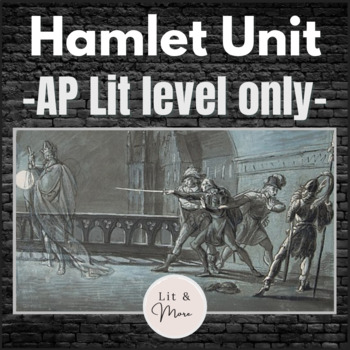
Hamlet Unit for AP Lit | Aligned with AP Lit Essential Skills!

AP or Senior English Hamlet Test, Shakespeare End of Unit Assessment

AP Literature Hamlet Multiple Choice Exam

Hamlet AP Lit Unit Plan

HAMLET 's 7 Soliloquies Annotations Analysis AND Worksheets AP LITERATURE PREP

AP Hamlet Comprehensive Unit (with 18 AP Exam Essay Prompts)

Hamlet - A Script Designed for AP English Literature

Hamlet AP Teaching Unit

" Hamlet and Philosophy" FULL UNIT (High School/ AP Literature)

AP Lit Hamlet Unit Plan Bundle

Hamlet Doodle Notes for AP Lit - Full Play

AP Lit Hamlet Act 5 Activities Bundle

Hamlet | Shakespeare | Analysis Mini BUNDLE | AP Lit and High School ELA

Hamlet Full Text & Workbook Bundle for AP Lit

HAMLET - AP Literature Essay Prompt - Act Two

Hamlet Free Response Packet- for AP ®* Lit / Honors Teachers

AP Lit Hamlet Act 1 Activities Bundle
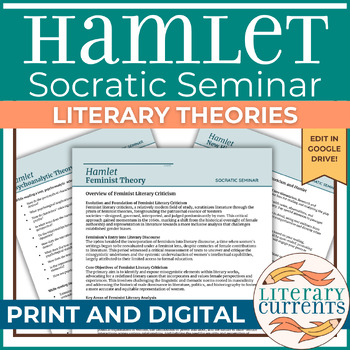
Hamlet | Shakespeare | Literary Theory Socratic Seminar | AP Lit Discussion

AP Hamlet Objective Quizzes Acts 1-5 and 5 AP Lit Prompts
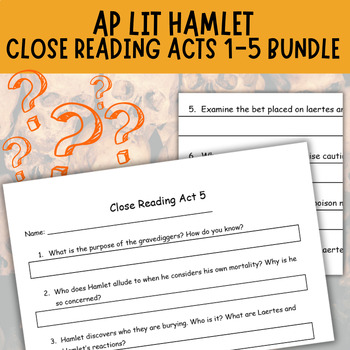
AP Literature Hamlet Close Reading Questions Acts 1-5
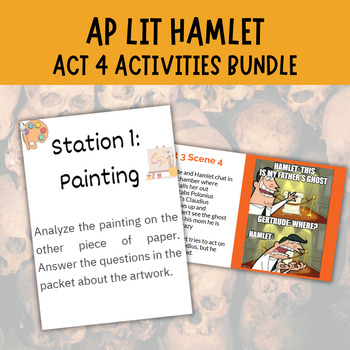
AP Lit Hamlet Act 4 Activities Bundle

Hamlet Quick Close Reading Passages Bundle for AP Literature
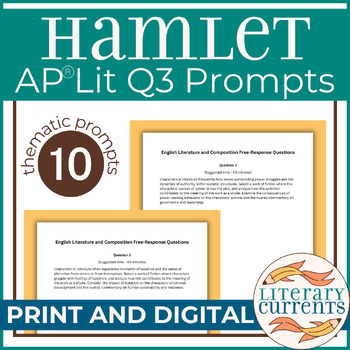
Hamlet | Shakespeare | Q3 Essay Prompts AP Lit Open Ended Literary Response
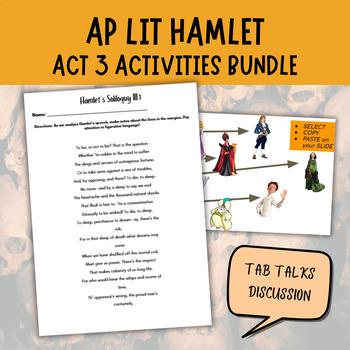
AP Lit Hamlet Act 3 Activities Bundle
- We're hiring
- Help & FAQ
- Privacy policy
- Student privacy
- Terms of service
- Tell us what you think
- Study Notes
- College Essays
AP English Notes
- Sample Essays
- Rhetorical Terms
- Bonus Knowledge
- Sample Thesis Statements
A thesis statement:
- tells the reader how you will interpret the significance of the subject matter under discussion.
- is a road map for the paper; in other words, it tells the reader what to expect from the rest of the paper.
- directly answers the question asked of you. A thesis is an interpretation of a question or subject, not the subject itself. The subject, or topic, of an essay might be World War II or Moby Dick; a thesis must then offer a way to understand the war or the novel.
- makes a claim that others might dispute.
- is usually a single sentence somewhere in your first paragraph that presents your argument to the reader. The rest of the paper, the body of the essay, gathers and organizes evidence that will persuade the reader of the logic of your interpretation.
Paragraph 1
In The Box Man , by Barbara Lazear Ascher, the protagonist reveals that a life of solitude need not always be lonely. Though the Box Man lives a life of solitude as a homeless wanderer, Ascher describes his “grand design” and “grandmotherly finger licking” to convince readers that their assumptions about homeless people are unfounded – and that they can live a dignified life. By describing the Box Man as “dignified” and “at ease”, Ascher paints a vivid picture of a man who chose a life a comfort and solitude and defeated loneliness by becoming his own friend.
Paragraph 2
In Upon the Burning of Our House , Anne Bradstreet ponders her unfortunate circumstances and appreciates that it was God’s will that her house burned to the ground. Bradstreet believed that every misfortune she encountered served to remind her of God’s will – in this case, she was reminded that “All is vanity” – a Biblical allusion meaning that everything in life is futile and the only worthy goal is entry into heaven. Bradstreet’s attitude is further revealed when she says “The world no longer let me love, / My hope and treasure lies above.” Bradstreet clearly feels that worldly life is fruitless; her sole concern is God.
Paragraph 3
In The Grapes of Wrath , John Steinbeck characterize the protagonist, Tom Joad, as a morally conscious person who stands up against evil. The image of Tom’s mother “slow with weariness” sitting and scraping potatoes affects Tom very much – so much that he is willing to give his life to rebel against the people who seek to harm his family. Through the use of imagery and diction, Steinbeck reveals Tom’s noble conscious and characterizes him as a rebellious – albeit rash – young man.
Paragraph 4
In the His Dark Materials Series by Philip Pullman, the setting is an essential element in the development and outcome of the plot in more ways than one. The protagonist, 11-year old Lyra Belacqua, lives in the precincts of Jordan College in Oxford growing up as an orphan among the old scholars. Her cheerful existence consisted of playing on the rooftops of the college and “waging war” with the local children. This contrasts sharply with the bright and exciting future she soon experiences after she escapes from the drudgery of college life. After escaping, Lyra begins a grand adventure, journeying to the north to meet armored bears, witches, and gyptians. The initial setting is important to the development of the plot because Lyra’s future resourcefulness and quick-wittedness in difficult situations were fine-tuned during the numerous challenges she faced as a child while fighting “wars” with the other local children. In addition, by understanding Lyra’s humble background, the reader can appreciate her future accomplishments.

You just finished Sample Thesis Statements . Nice work!
Previous Essay Next Essay
Tip: Use ← → keys to navigate!
How to cite this note (MLA)
More ap english sample essays.
- Sample Definition Essay - "Success"
- Sample Character Analysis Essay - "Hamlet"
- Essay Tips: Style Analysis - Tone of Voice Words
- Sample Compare and Contrast Essay - "Lincoln/Douglass"
- Sample Literary Devices Essay - "Things Fall Apart"
- Sample Character Analysis Essay - "Dead Poet's Society"
- Sample Compare and Contrast Essay - "Langston Hughes"
- Sample Informative Essay - "Great War"
- Sample Literary Devices Essay - "American Scholar"
- Essay Tips: Syntax - What to Say About It
- Sample Research Paper - "The Patriot Act"
- Sample Author Analysis Essay - "Edgar Allan Poe"
- Sample Cause and Effect Essay - "Great Gatsby"
- Sample Classification Essay - "Hamilton vs. Jefferson"
- Essay Tips: 5 Ways to Improve Your Essay Scores
- Violent Video Games are Not as Harmful as Parents Make Them Seem
- Sample Letter to the Editor - "Animal Rights"
- Morality: Fate Is Not In the Eye of the Beholder
- 474,731 views (112 views per day)
- Posted 12 years ago

IMAGES
VIDEO
COMMENTS
The character Hamlet from Shakespeare's tragedy Hamlet explores these existential questions, seeking truth and understanding as he tries to come to grips with his father's death. In the end, Hamlet proves to be an exceedingly existential character. Prince Hamlet is a university student who enjoys contemplating difficult philosophical questions.
3. Complete the AP Exam and turn it in the complete exam( including the three essays) on Jan. 6, 2014. 4. We'll study Hamlet's final two soliloquy on Thursday. Be prepared. Hamlet E-Text. Hamlet Audio Assessment. Reading Quiz. Reading Quiz on Hamlet (Acts I & II)
An essay examining the importance of the Ghost as a character the ghost of denmark hamlet is story full of conflict and revenge which would never take place ... L Zirkelbach East of Eden AP Research Paper; AP English Literature and Composition p1; Essay Guidelines ... FRQ 3 - Sample essay of FRQ 3 on the ap lit exam including comments, prompt ...
AP® English Literature and Composition ... Th is collection of essays on teaching drama in the AP classroom is an excellent place to start. As each contribution reached my desk, I was galvanized by how these new ideas would ... Th anks to Tim Averill, my students will approach Hamlet in imaginative and unexpected ways. Th ey will follow the ...
The story of Hamlet is based on a Danish revenge story first recorded by Saxo Grammaticus in the 1100s. In these stories, a Danish prince fakes madness in order to take revenge on his uncle, who had killed the prince's father and married his mother. Many scholars believe that Shakespeare was not the first person to adapt this story—Thomas Kyd ...
(2011: ap11_frq_english_lit.pdf) (2011 Form B: ap-2011-english-literature-free-response-questions-form-b.pdf) (2009: ap09_frq_english_literature.pdf) (2009 Form B: ... 2009:Hamlet and the Symbol; The 2009 open essay question defines a symbol as "an object, action, or event that represents something or that creates a range of associations ...
AP® English Literature and Composition Sample Essays (the Good, the Bad, and the Ugly) The free response section of the beloved AP® Lit exam requires three written responses from students: (1) A literary analysis of a given poem. (2) A literary analysis of a given passage of prose fiction (this may include drama)
swords. When Laertes reveals the conspiracy, Hamlet wounds the King and forces the poisoned drink upon him. Laertes and Hamlet reconcile, and Laertes dies; Hamlet prevents Horatio from drinking the poison so that he can live to tell the truth. Hamlet names as his successor young Fortinbras, who arrives and orders Hamlet buried with all dignity.
Ghost Scene Clips: We will use the clips below to complete the assignment explained on the home page.You may also want to refer to your "Mad-Glad-Sad" handout from our study of tone. Click here to get to the handout.
A level English Lit. "Hamlet" - essay plans (A* student) Hamlet Essay Plans. 1. How does Shakespeare explore corruption in Hamlet. 1 2 3. Point Claudius as the corrupt. leader is the most significant showing of corruption. in Hamlet. Reference to the idea of a. corrupted fountain - Duchess of Malfi - Webster. Corruption of Hamlet's. mind
Download free-response questions from this year's exam and past exams along with scoring guidelines, sample responses from exam takers, and scoring distributions. If you are using assistive technology and need help accessing these PDFs in another format, contact Services for Students with Disabilities at 212-713-8333 or by email at ssd@info ...
HAMLET: AP Literature Essay Prompts Below are five prompts which appeared in past AP Lit Exams. Your assignment is to choose two prompts and write an analytical essay for each. The first essay will be hand written and done during class and is due in class on Friday, January 25, 2019. The second essay should be done at home and is due Tuesday, January 29.
She is the wife. In Charlotte Bronte's novel Jane Eyre she is the hidden past of Rochester. The reason for deception for Jane's protection, for his own protection and for the protection of the future with the woman he so dearly loves. She is the danger. Rochester's wife is manical, violent and disturbed.
Consider aspects of Hamlet, Prince of Denmark that make this play a tragedy. (Besides the structure of the play, think of Hamlet's isolation - he also rises far above the other characters in the play - his betrayal, his wasted potential, his being a "victim of circumstances", et al.) 30 In many ways Hamlet is an anachronism in the play ...
Here is a sample of a hamlet essay lee david lee mrs. philips ap literature 12 october 2022 hamartia vs severity of death hamlet had many deaths that were due. ... Here is a sample of a hamlet essay. University Georgia State University. Course. English Composition I (ENGL 1101) 139 Documents. Students shared 139 documents in this course.
This Pre-AP/AP Resource for Hamlet by William Shakespeare can give students an edge on their AP English exams by providing guided practice that models the format, style, and skill achievement of the multiple-choice and free response questions students will encounter. Teachers can easily integrate resource guide activities into their existing lesson plans to gauge understanding of literary and ...
Hamlet: AP Exam Prompts To prepare for the essay exam, for each of the real AP exam prompts below (for which Hamlet was a recommended text), create a thesis statement that would be the starting place for an essay answer. 1. Choose a novel or play in which some of the most significant events are mental or psychological; for example, awakenings, discoveries, changes in consciousness.
DOS Writing Document. Tragedy Notes. Writing 1: Success (500 words) Writing 2: Linda Quotes (300 words) Writing 3: Success Quotes notes and response (300 words) Writing 4: Themes and Tragedy Writing (800 words) Writing 5: DOS Final Response Questions (650-800 words) Writing 6: KSP Response (350-400 words) .
AP Literature and Composition Central. This resource is a bundle of all of my AP Literature Prose passage essay prompts for Hamlet 's seven soliloquies. These seven monologues are typically $5 a piece, but if you purchase all of them together you're getting a $35 value for only $19.99!
View Notes - ap Hamlet essay from ENGL MISC at Albany State University. Mr, Mahoney. AP English Hamlet essay. Write a four-page (1200-1500 words) essay on Shakespeare's Hamlet exploring one of the
A thesis statement: tells the reader how you will interpret the significance of the subject matter under discussion. is a road map for the paper; in other words, it tells the reader what to expect from the rest of the paper. directly answers the question asked of you. A thesis is an interpretation of a question or subject, not the subject itself.
AP English Hamlet Essay - Hamlets Existentialism... Doc Preview. Pages 6. Total views 100+ Archbishop Murphy High School. ENGLISH. ENGLISH AP Languag. sean.michael.goldfinch. 9/22/2014. 100% (2) View full document. Students also studied. simone de beauvoir.pdf. University of California, Davis. PHILOSOPHY 57.